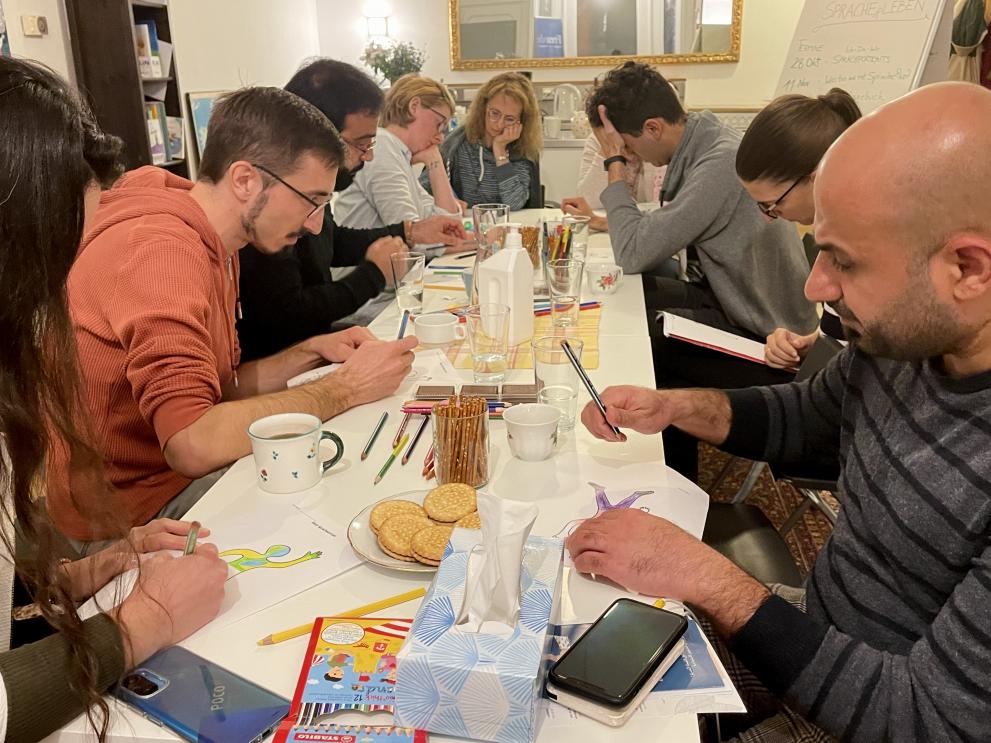Azima (an Arabic word meaning 'resilience' or 'inner strength'), is a project run by civil society organisation Fremde werden Freunde. The project works to strengthen the inner resources and coping strategies of young people with a refugee or migrant background living in Austria, through the provision of psychological and psychosocial services.
Project Goal
The COVID-19 pandemic is causing a number of negative social, economic, and psychological impacts on people. Psychosocial distress increased massively during the pandemic and there is a great need for psychosocial care throughout society. However, not all population groups are equally affected by the pandemic: vulnerable groups such as migrants are substantially affected by the crisis. Moreover, especially young adults suffer mentally from the pandemic. This is where the project comes in.
The overall aim of the project is to increase awareness of mental health among migrants and refugees and to help young people to improve their mental health in times of the COVID-crisis. It provides psychological and psychosocial services in order to strengthen their own psychological resilience.
Specifically, Azima aims to achieve the following:
- To accompany young refugees and migrants by means of coaching and psychological counselling;
- To develop solutions and strategies to prevent precarious situations, to find a path out of seemingly hopeless situations and to strengthen their psychological resilience;
- To stimulate an awareness-raising process for mental health among the target group and to counteract the stigmatization of mental illness;
- To strengthen awareness of interculturality in psychosocial support offers.
How it works
Azima offers a variety of interventions. All offers are free of charge and ultimately aim at reducing stigmatisation of mental health related difficulties. Fremde werden Freunde coordinates all activities and the project is implemented in cooperation with the Vienna University of Economics and Business and the Sigmund Freud University.
The following activities are available:
- Individual psychological counselling sessions for young migrants and refugees;
- Psychological group sessions, including groups for women only;
- Individual coaching sessions supporting decision making processes;
- Workshop sessions on various topics targeting resilience, health, stress relief and coping mechanisms;
- Workshops and trainings on the topic of psychological counselling and coaching in an intercultural context, for health care professionals, coaches and students of psychology;
- Leisure events and intercultural activities which foster participants' wellbeing and promote their exchange with peers.
Results
Over the course of one year, 740 individuals were reached through the project. 45 migrants received individual psychological counselling, and 26 migrants participated in the psychological groups. In total, 146 individual psychological counselling sessions and 12 group session took place.
31 youngsters made use of coaching within a total of 75 coaching session, and six coaches were provided with target group oriented and sensitive training material and supervision. 9 workshops and trainings took place with 40 attendees. In total, 60% of all beneficiaries were women. 530 individuals participated in the leisure events and intercultural activities.
16 videos and 5 podcasts were produced, and 190 social media posts and 25 newsletter and blog posts were posted.

Evaluation
The project was evaluated via various means. Individual coaching and counselling sessions were evaluated prior to as well as after the respective interventions; psychological groups and workshops were assessed with an (online) questionnaire; coaches received supervisions and were interviewed about their experiences in the project.
Additionally, the Vienna University of Economics and Business conducted stakeholder interviews with relevant experts in the field.
Who benefits
The primary beneficiaries of the project are the young migrant and refugees receiving psychological support and coaching. The secondary target group includes students at Sigmund Freund University, health care professionals, coaches and psychology students, who all receive trainings in giving medical and psychological support.
Funding and resources
Funding for this project was provided by the Austrian Federal Ministry for Social Affairs, Health, Care and Consumer Protection. The total budget for one year of conceptualisation and implementation was € 300 000.
About this good practice
- Project dates
- -
- Geographic area
- Austria
- Organisation
- Fremde werden Freunde
- Website
- Contact person
- Kathrin Limpel
- Position
- CEO
Details
- Original source
- Posted by
